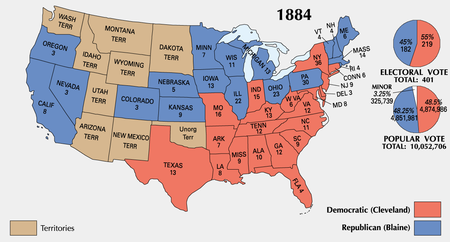U.S. presidential election, 1884
|
|
The U.S. presidential election of 1884 featured mudslinging and personal acrimony on a level never before seen. On November 4, 1884 Democrat Grover Cleveland became the first Democrat elected to the Presidency since the Civil War, narrowly defeating Republican James Blaine. The race was decided in Cleveland's home state of New York, carried by the native son by just 1,100 votes - and awarding its electors, and the election, to Cleveland.
| Contents |
Nominations
Republican Party
Though it could have been his for the asking, incumbent President Chester Arthur did not actively seek the 1884 nomination. Though not widely known at the time, Arthur was suffering from Bright's disease and would die less than two years later. The GOP turned instead to James Blaine of Maine as their Presidential nominee, and John Logan as its Vice Presidential choice.
Democratic Party
Grover Cleveland of New York would be chosen as the Presidential nominee by the Democratic Party at its convention, defeating a host of candidates who failed to claim the nomination in years past, including Thomas F. Bayard, Thomas Hendricks (who would be awarded the Vice Presidential nomination), Allen G. Thurman and Samuel J. Randall.
Greenback Party
The Greenback Labor Party dropped "Labor" from its name and chose Civil War hero Benjamin Franklin Butler as its Presidential nominee and Absolom West for Vice President.
Prohibition Party
What today bills itself as the nation's "oldest third party" nominates its third Presidential ticket, choosing John St. John for President and William Daniel for Vice President. The initial Prohibition Party platform was straight-forward: an advocation for the criminalization of alcohol.
General election
Campaign
The issue of personal character marked this campaign. New York Governor Grover Cleveland was known as "Grover the Good" for his personal integrity; in the space of the three previous years he had become, successively the Mayor of New York City and then the Governor of the state, cleaning up large amounts of Tammany Hall's graft. Former Speaker of the House James G. Blaine, on the other hand, had been prevented from getting the Republican presidential nomination during the previous two elections because of the stigma of the "Mulligan letters": in 1876, a Boston bookkeeper named James Mulligan had located some letters showing that Blaine had sold his influence in Congress to various businesses. In just one deal, he had received $110,150 from the Little Rock and Fort Smith Railroad for, among other things, securing a federal land grant.
Thus, it was a huge shock when, on July 21st, the Buffalo Evening Telegraph reported that Cleveland had fathered a child out of wedlock, that the child had gone to an orphanage, and that the mother had been driven to an asylum. Cleveland's campaign decided that candor was the best approach to this scandal: they admitted that Cleveland had formed an "illicit connection" with the mother and that a child had been born and given the Cleveland surname. They also noted that there was no proof that Cleveland was the father, and claimed that, by assuming responsibility and finding a home for the child, he was merely doing his duty. Finally, they showed that the mother had not been forced into an asylum; her whereabouts were unknown. The Cleveland campaign's approach worked and the remained close through Election Day. In fact, many Republican reformers, put off by Blaine's scandals, worked for the election of Cleveland; these reformers were known as "Mugwumps".
In the final week of the campaign, Blaine's campaign suffered a catastrophe. A group of New York preachers visited Blaine and made a speech castigating the Mugwumps. Their spokesman, the Rev. Dr. Samuel Burchard, made this fatal statement: "We are Republicans, and don't propose to leve our party and identify ourselves with the party whose antecedents have been rum, Romanism, and rebellion." Blaine did not notice Burchard's anti-Catholic slur, nor did the assembled newspaper reporters, but a Democratic operative did, and Cleveland's campaign managers made sure that it was widely publicized. The statement energized the Catholic vote in New York City heavily against Blaine, costing him New York state and the election.
Results
Template:Start U.S. presidential ticket box Template:U.S. presidential ticket box row Template:U.S. presidential ticket box row Template:U.S. presidential ticket box row Template:U.S. presidential ticket box row Template:End U.S. presidential ticket box (a) Template:U.S. popular vote total disclaimer

